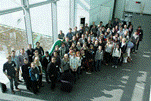The viral flu, or influenza, is still presenting a permanent, worldwide threat to humans and animals. A constant stream of new influenza pathogens are emerging from the animal world and leading to serious illness in humans. To effectively fight against these pathogens, an interdisciplinary research approach is of fundamental importance. The FluResearchNet, which is being coordinated at the University of Münster, integrates all the influenza expertise in Germany. Virologists, immunologists, cell biologists, veterinary and human medics as well as experts from the federal institutions Robert Koch Institute and Friedrich-Loeffler-Institut collaborate to advance the joint research on influenza viruses.
Professor Stephan Ludwig from the Institute for Molecular Virology of the University of Münster is the coordinator of the FluReseachNet and describes the work as follows: “The research undertaken by the FluResearchNet is the concrete implementation of the One Health Initiative: through the cooperation of researchers of different expertise we can understand influenza in animalslike birds and pigs, and therefore learn how to fight against human influenza.“ The collaboration has already led to a considerable number of promising results. This year the firm Activaero GmbH started a clinical phase II study with severely diseased influenza patients. The data for the mechanism of action of the tested medicines are based on the research works from the FluResearchNet. “We hope to recruit many patients during the coming influenza season in order to soon have valid results“, wishes Stephan Ludwig.The date of a marketing approval is currently unclear. Various insights uncovered in the network have led to patent submissions. Several of the approaches are now being used in cooperation with companies for clinical advancement. “This is a fine example of how fundamental research ultimately serves for the benefit of the population“, says Professor Ludwig. FluResearchNet has also made a decisive contribution to the monitoring of influenza, particularly among pigs, who are classed as “mixing vessels“ for emerging viruses. A first German sequencing consortium was established at the University of Jena, enabling a sixth of all pig flu sequence entriescoming from the FluResearchNet. “With this setup we know the exact activity of influenza in pigs in Germany and can recognise new and potentially human-endangering viruses“, concludes Ludwig.
On 7th and 8th October 2013 in Münster the results of the FluResearchNet were presented in detail. As the government funding of the research association ends this year, it was discussed how the cooperation can be arranged in the future. “The work now becomes a lot more difficult as the financial support through project funding is no longer available“, states Ludwig.
However all experts agree that the collective research must continue. “It is the only way for future pandemics to be adequately faced and for the population to be protected.“ In order to facilitate collective working in the future, FluResearchNet could not only continue as a brand but also continue encouraging active exchange of knowledge. Particularly suitable for this exchange is the International Influenza Meeting. The event takes place every two years in Münster and has already established itself as a firm fixture in the scientific events calendar. At the previous meeting approximately 300 scientists from 24 nations took part. The next event will take place from Sep 21-23, 2014 in Münster.
FluResearchNet is one of 11 zoonoses research consortia financed by the German Federal Ministry for Education and Research. The network is coordinated under the umbrella of the National Research Platform for Zoonoses by Professor Stephan Ludwig from the Institute for Molecular Virology of the University of Münster and consists of 12 sub-projects, which are conducted across the whole of Germany. The research association was founded in 2007 and received a two-phase funding grant of approximately €8.6 million.
Further information to the FluResearchNet is to be found under this link.

Participants of the FluResearchNet meeting in Muenster



